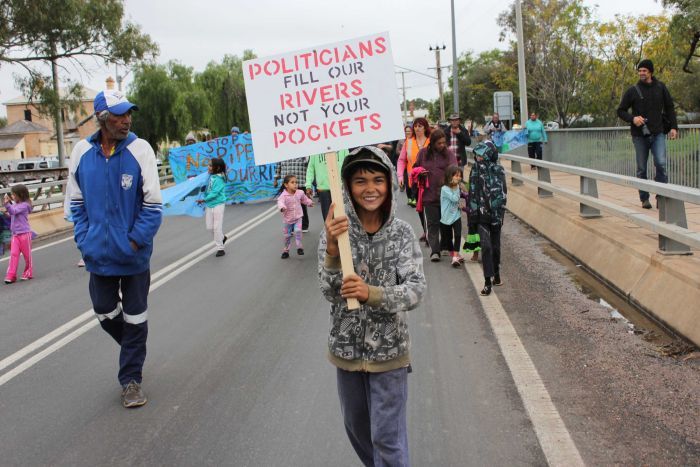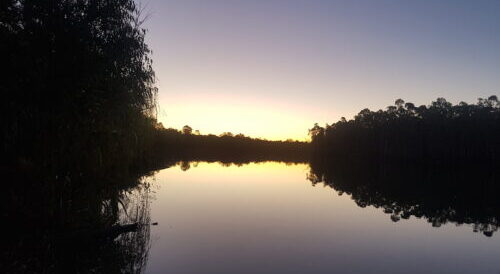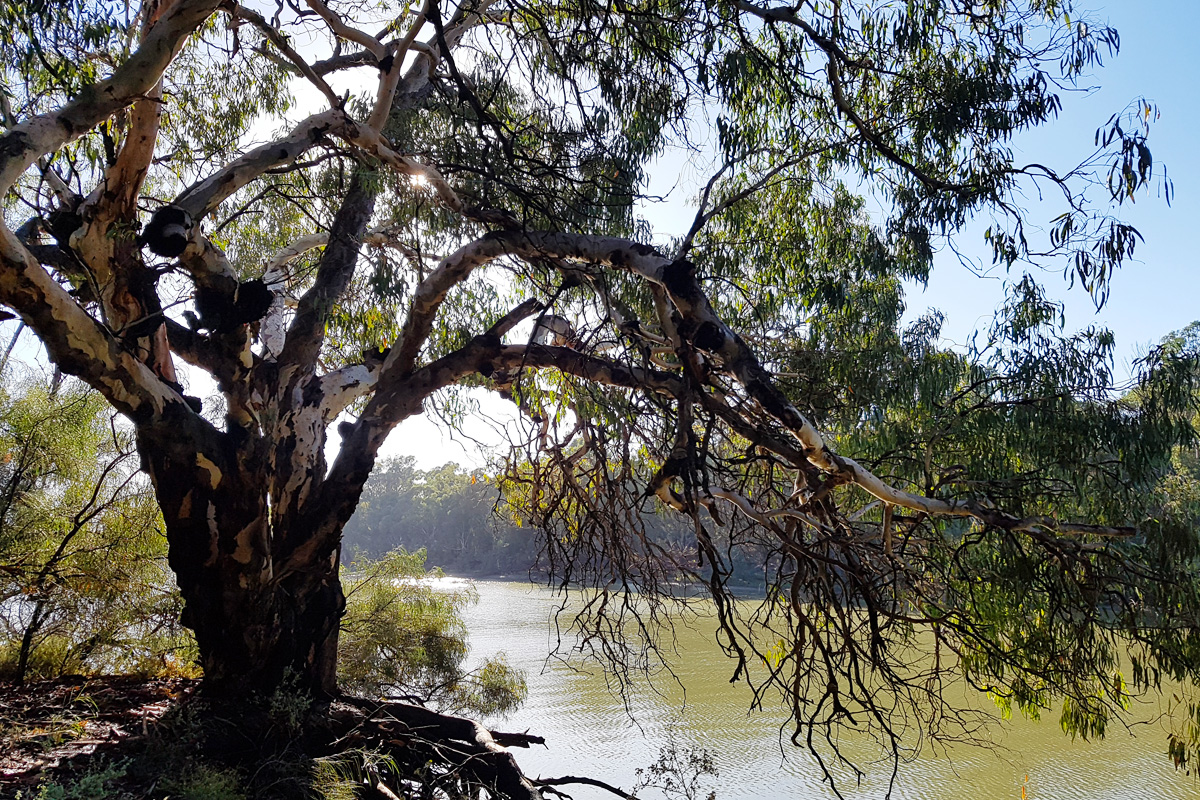In the lead up this week’s Council of Australian Governments (COAG) meeting, MLDRIN has joined with 21 environment, Indigenous and community groups today to call on State and Commonwealth governments to get on with the job of implementing the Murray Darling Basin Plan.
‘Dramatic’ declines
The rivers, wetlands and floodplain forests of the Murray Darling have been starved of water due to over-extraction and regulation. In fact, just this week, a major study identified a ‘dramatic’ decline in waterbird numbers in the Basin over the last 30 years. Too much water is being taken out of the system. When Country is unhealthy, Aboriginal culture and knowledge is under threat. That’s why MLDRIN is teaming up with organisations across the Basin, including the Northern Basin Aboriginal Nations, to make sure our message is heard.
The Murray Darling Basin Plan promised to recover 3200 gigalitres of water for the environment. This crucial water will help sustain the river ecosystems that are deeply significant to Aboriginal culture. But now Basin governments are trying to back out of their committment by cutting water recovery targets and proposing ‘complimentary measures’ instead of real water for the environment. This is simply not good enough.
Joint media release 7 June 2017: Getting the Murray-Darling Basin Plan back on track
A coalition of 22 environment, Indigenous and community groups has called on State and Commonwealth governments to implement the Murray-Darling Basin Plan on time and in full and rule out delaying or weakening environmental water recovery targets.
The call comes ahead of Thursday night’s special COAG meeting of basin State Premiers and the Prime Minister, where they will decide on a credible pathway to implementing the Basin Plan as agreed in 2012.
The Basin Plan package in its entirety, which was endorsed by all Basin governments and a bipartisan vote in both houses of federal parliament, aims to recover 3,200 gigalitres (GL) of water for the environment, whilst allowing some of this water to be offset by projects that achieve equivalent environmental outcomes.
The groups are calling for the package to be implemented on time and in full to bring benefits of healthy rivers to the communities, Aboriginal people, wildlife, farms and fishers of the Murray-Darling.The groups are calling on COAG Ministers to:
- Reject proposed changes to water recovery targets in the northern Basin as failing to meet the international and national obligations and laws. MDBA’s proposals are not supported by adequate scientific and socio-economic data.
- Restore scientific rigour to the sustainable diversion limits (SDL) adjustment process in the southern Basin.
- Acknowledge and incorporate into socio-economic assessments that water for the environment serves many environments and communities.
- Provide structural adjustment, regional development and transition planning for adversely impacted communities, rather than abandoning environmental water recovery in an effort to maintain status quo in the face of a drying climate.Provide a pathway to recovering the legally-required additional 450 GL through efficiency, and if necessary, buyback measures.
- Encourage States to invest in complementary measures, such as pest control and riparian revegetation, as a complement to environmental water recovery, not as a substitute for it.
- Ensure that the findings of the National Cultural Flows Research Project are integrated into the ongoing implementation of the Basin Plan.
Quotes from key spokespeople:
“The Basin Plan is already a compromise; it is the bare minimum required to keep the Murray Mouth open and the Coorong alive and it leaves many wetlands and native species at risk. The provision of a credible pathway to recovering the legally required additional 450GL through efficiency measures is critical to protect the globally significant Lower Lakes and Coorong estuary,” said Craig Wilkins, CEO of the Conservation Council of South Australia.
“Recovering environmental water is vital to sustaining Aboriginal culture and Country. Basin States and the MDBA must collaborate with Aboriginal organisations to ensure a rigorous assessment of impacts on Aboriginal cultural values arising from any change to the SDL,” said Mr Rene Woods, Chair of Murray Lower Darling River Indigenous Nations.
“Our governments should not abandon environmental water recovery in an attempt to maintain a status quo that will inevitably change due to global warming. Rather than saying having healthy rivers is too hard, governments need to start providing regional development and transition support to communities who will need to adapt to life with less water. Healthy communities need healthy rivers,” said Juliet Le Feuvre, Healthy Rivers Campaigner at Environment Victoria.
“Despite promises to deliver the Basin Plan in full and on time, we have seen nothing but delay from the Turnbull Government when it comes to delivering on the full commitments outlined in the Basin Plan. Another delay on the promised 450 GL of water for the river would be a kick in the guts for our native wildlife and the people of South Australia,” said James Trezise of the Australian Conservation Foundation.
“We reject the proposed changes to water recovery targets in the Northern Basin. They fail to meet the international obligations to protect wetlands that are the foundation stones of the Commonwealth Water Act and Basin Plan. In particular, reductions of up to 21 GL of held environmental water in the Gwydir system and 28 GL in the Macquarie system will threaten Ramsar listed wetlands,” said Bev Smiles, spokesperson for the Inland Rivers Network.
“Governments and the MDBA must acknowledge and incorporate into socio-economic assessments that water for the environment serves many community environments, including social, cultural and economic. This results in better quality water for stock and domestic purposes, enhanced river based cultural and social activities for all community groups, improved tourism and recreational fishing and more agriculturally productive floodplains,” said Terry Korn, President of the Australian Floodplain Association.
“We must restore rigour to the SDL adjustment process in the southern Basin. A full range of efficiency, constraints and supply measures with robust business cases and risk assessments should be submitted to MDBA for assessment and the assessment must occur within the limits of change hardwired into the Basin Plan,” said John Pettigrew, water spokesperson for Environmental Farmers Network.
“Dredges in the river mouth are currently keeping the Murray Darling Basin on life support. Australia is failing its international obligations to protect the globally significant Lower Lakes and Coorong estuary,” said Peter Owen, Director of the Wilderness Society South Australia.
MLDRIN CONTACT: Rene Woods (Chair): 0424 299 929



